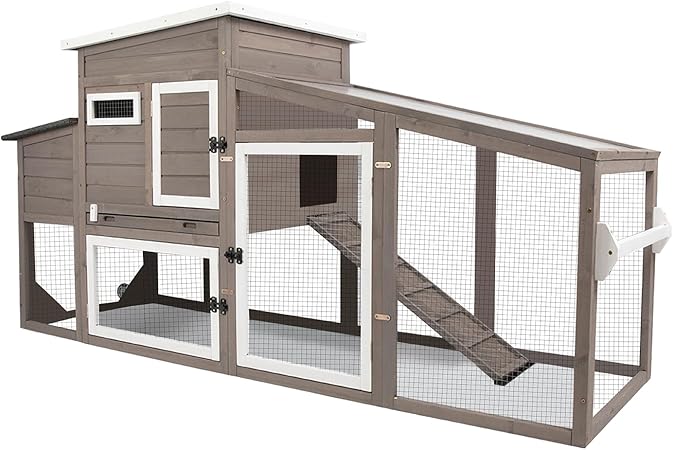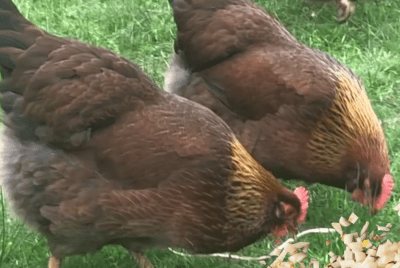5 Secrets to a Clean Chicken Coop.
Read about our 5 Secrets to a Clean Chicken Coop and how to keep it that way. It’s important to keep your chicken coop clean to ensure the health and well-being of your flock. Neglecting coop cleanliness can lead to disease outbreaks, pest infestations, and unhappy chickens. Here are five secrets to maintaining a clean chicken coop that will benefit both your birds and your peace of mind.The Easy Way to a Clean Chicken Coop
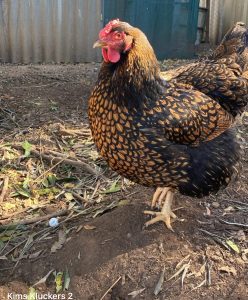
Key Takeaways:
1.Regular cleaning: Maintain a clean chicken coop by regularly removing soiled bedding, droppings, and leftover feed to prevent odors and pests.
2.Proper ventilation: Ensure good airflow in the coop to reduce moisture build-up and ammonia levels, which can lead to respiratory issues in chickens.
3.Use of safe cleaning products: Choose non-toxic, poultry-safe cleaning solutions when disinfecting the coop to protect your chickens from harmful chemicals.
4.Deep cleaning schedule: Implement a deep cleaning schedule to thoroughly clean and disinfect the coop on a regular basis to keep your chickens healthy and safe.
5.Regular pest control: Keep pests like mites, lice, and rodents at bay by regularly inspecting and treating the coop with appropriate pest control measures.
6.The Easy Clean Chicken Coop: The Deep Litter Method for Chickens
Secret 1: Establishing a Cleaning Routine
One of the crucial secrets to maintaining a clean chicken coop is to establish a consistent cleaning routine. By following a set schedule for daily maintenance as well as weekly deep-cleaning practices, you can ensure that your coop remains a healthy environment for your flock.
Daily Maintenance Tips
Daily cleaning is crucial to prevent the buildup of manure, pests, and bacteria in the chicken coop. Start by removing soiled bedding and replacing it with fresh material. Make sure to also clean and refill waterers and feeders to promote the health of your chickens.
- Remove any feces daily to maintain a clean environment.
- Inspect nesting boxes and remove any eggs to prevent breakage.
- Check for signs of illness or injury in your chickens during daily cleaning.
Recognizing the importance of daily maintenance will help you stay on top of keeping your chicken coop clean and your birds healthy.
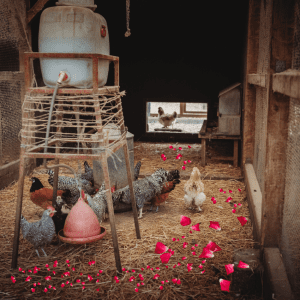
Weekly Deep-Cleaning Practices
Practices for weekly deep-cleaning involve a more thorough cleaning of the coop to eliminate any lingering bacteria or parasites that may be present. Take the time to scrub down all surfaces, including roosts, nesting boxes, and walls, with a disinfectant cleaner to maintain a sanitary environment for your chickens.
Deep-cleaning on a weekly basis will help to reduce the risk of disease outbreaks and keep your flock healthy and happy in their clean coop environment.
Secret 2: Choosing the Right Bedding
Clearly, choosing the right bedding for your chicken coop is necessary for maintaining a clean and healthy environment for your flock. The bedding material you select will impact odor control, moisture absorption, and overall cleanliness, so it’s crucial to make an informed decision.
Types of Bedding Material
In the context of choosing bedding for your chicken coop, there are several options available. Some of the most popular bedding materials include:
- Straw: Absorbent and comfortable, but can mold quickly.
- Pine Shavings: Good odor control but can be dusty.
- Paper-based Bedding: Environmentally friendly and absorbent.
- Sand: Easy to clean but can be abrasive on chicken’s feet.
- Deep Litter Method: Comprised of a mix of materials that compost in the coop over time.
Any of these bedding materials can work well in your coop, depending on your personal preferences and the needs of your flock. Experiment with different options to see which one works best for you.
How to Maintain and Replace Bedding
Bedding maintenance is crucial for keeping your chicken coop clean and healthy. Regularly cleaning and replacing bedding will help control odors, reduce the risk of pests, and prevent the spread of disease among your flock. Please Wear a mask when working in your coop and cleaning due to unseen mold spores floating in the air you can’t nexessarily see. They get into your sinus passages and can reek havoc inside your body.
I have chronic sinusitis as I never wore a mask even though my intuition used to say, you really should be wearing a mask. The outcome to this is that i have no sense of taste or smell.
Understanding the signs of soiled or moldy bedding is important for knowing when it’s time to replace it. Inspect the bedding regularly for any foul odors, excessive moisture, or mold growth. When you notice these signs, it’s time to remove the old bedding and add fresh material to keep your coop clean and your chickens happy.
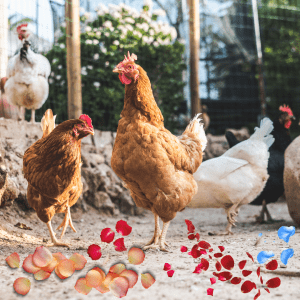
Secret 3: Managing Coop Humidity and Ventilation
Despite often being overlooked, managing coop humidity and ventilation is crucial for a clean and healthy chicken coop environment. Poor ventilation and high humidity levels can lead to a host of problems, including respiratory issues for your flock and the growth of harmful bacteria.
Ventilation Solutions
Ventilation is key to regulating air quality in the chicken coop. Ensure proper airflow by installing vents or windows that can be opened and closed as needed. This will help remove stale air, excess moisture, and odors from the coop. Consider using a fan to improve air circulation on hot days or when ventilation is limited.
Humidity Control Techniques
To control humidity in the chicken coop, use materials like straw or wood shavings to absorb moisture from droppings. Regularly clean out wet bedding and replace it with fresh, dry material to prevent mold and bacteria growth. Additionally, consider using a dehumidifier in the coop if humidity levels remain high despite ventilation efforts.
Secret: Proper management of coop humidity and ventilation is imperative for maintaining a clean and healthy environment for your chickens. By implementing these strategies, you can prevent respiratory issues, bacterial growth, and other health hazards that thrive in damp and poorly ventilated conditions.
Secret 4: Pest Prevention and Control in a Clean Chicken Coop.
Natural Deterrents and Solutions
Keep pesky pests away from your chicken coop by utilizing natural deterrents and solutions. One effective method is to plant herbs like mint, lavender, and oregano around the coop, as these plants naturally repel insects. Additionally, you can sprinkle diatomaceous earth in and around the coop to combat pests like mites and lice.
Safe Use of Pesticides
When natural deterrents are not enough, and you need to resort to pesticides, it is crucial to do so safely. Always opt for organic pesticides that are specifically designed for poultry and follow the instructions carefully. Be sure to apply them when the chickens are not in the coop, and allow for sufficient ventilation to prevent any harmful fumes from lingering.
Understanding how to effectively prevent and control pests in your chicken coop is important for the well-being of your flock. By incorporating natural deterrents and utilizing pesticides cautiously and appropriately when necessary, you can maintain a clean and healthy environment for your chickens to thrive in.

Secret 5: Organizing Coop Space for Easy Cleaning
Once again, maintaining a clean chicken coop is imperative for the health and well-being of your flock. Secret 5 focuses on organizing your coop space to make cleaning a simpler and more efficient process. By implementing smart design and storage solutions, you can optimize your coop layout for cleanliness.
Design for Cleanliness
Cleanliness starts with the design of your chicken coop. Consider using materials that are easy to clean and disinfect, such as smooth, non-porous surfaces for walls and floors. Install removable nesting boxes and perches that can be easily taken out for thorough cleaning. Design your coop with adequate ventilation to reduce moisture and odors, which can lead to bacterial growth.
Implementing Storage Solutions
Storage is key to maintaining a clutter-free coop. Implementing storage solutions such as hooks, shelves, and bins can help keep tools, feed, and supplies organized and easily accessible. Store feed in airtight containers to prevent contamination from pests and moisture. Consider labeling bins and containers for quick identification of contents.
This organized approach to storage not only makes cleaning easier but also prevents accidents by keeping potentially hazardous items out of reach of your chickens. By implementing these storage solutions, you can create a more efficient and safe environment for your flock.
Additional Tips for a Clean Chicken Coop.
For chicken keepers looking to elevate their coop cleaning game, here are some additional tips to ensure a sparkling and sanitary environment for your feathered friends:
Do’s and Don’ts of Coop Cleaning
To maintain a clean and healthy coop environment, it’s important to follow some basic do’s and don’ts of coop cleaning. Do regularly remove soiled bedding and replace it with fresh shavings to prevent the buildup of ammonia fumes, which can be harmful to your chickens’ respiratory systems. Don’t forget to scrub and disinfect feeders, waterers, and any other equipment regularly to prevent the spread of disease among your flock. The key is to stay consistent with your cleaning routine to keep your coop in top condition.
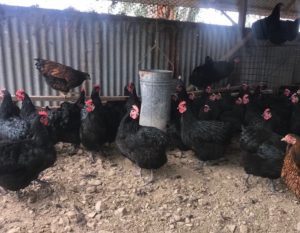
Innovative Tools and Products
Tools and products play a crucial role in maintaining a sparkling coop. Investing in innovative cleaning tools such as a poop hammock or a power washer can make the cleaning process more efficient and effective. A poop hammock hangs beneath the roosting bars to catch droppings, making it easier to keep the coop tidy and odor-free. Power washers can be used to quickly clean the coop’s exterior and remove stubborn stains. By incorporating these tools into your cleaning routine, you can achieve a spotless coop with ease.
Bumblefoot
Bumblefoot (also known as pododermatitis) is a common inflammatory condition that affects the feet of birds, particularly chickens and other poultry. It occurs when the foot becomes infected due to a cut, scratch, or pressure sore that allows bacteria (often Staphylococcus aureus) to enter and cause an infection. A clean coop is a way of preventing bumblefoot.
Causes of Bumblefoot
- Injuries: Cuts, splinters, or abrasions on the foot pad can allow bacteria to enter.
- Hard or Rough Surfaces: Standing or walking on hard, uneven, or abrasive surfaces, such as rough perches or wire flooring, can cause foot injuries.
- Obesity: Overweight chickens put extra pressure on their feet, increasing the risk of developing sores or injuries.
- Poor Nutrition: Deficiencies in certain nutrients, like vitamin A, can weaken the skin and make it more susceptible to injury.
- Poor Hygiene: Unsanitary living conditions can increase the chances of infection when there is a wound.
Symptoms of Bumblefoot
- Swelling: The foot may appear swollen or hot to the touch.
- Redness and Inflammation: The affected area may look red or inflamed.
- Limping or Lameness: The chicken may favor one leg, limp, or have difficulty walking.
- Scabs or Lesions: A dark, circular scab or abscess may form on the bottom of the foot.
- Reluctance to Move: The chicken may be less active, reluctant to walk, or spend more time sitting.
Treatment for Bumblefoot
- Cleaning and Disinfecting: Gently clean the affected area with an antiseptic solution. Soaking the foot in warm, Epsom salt water can help reduce swelling.
- Bandaging: Applying an antibiotic ointment and bandaging the foot can protect it from further injury and promote healing.
- Surgical Intervention: In severe cases, a vet may need to perform a minor surgical procedure to remove the infected tissue.
- Antibiotics: A vet may prescribe oral or injectable antibiotics to treat the infection.
Prevention of Bumblefoot
- Provide Soft, Clean Bedding: Use materials like straw or shavings to cushion the coop floor and reduce pressure on the feet.
- Use Smooth Perches: Provide smooth, rounded perches that are easy on the birds’ feet.
- Maintain Proper Weight: Ensure chickens have a balanced diet to prevent obesity and nutritional deficiencies.
- Regular Foot Checks: Inspect your chickens’ feet regularly to catch any signs of injury or infection early.
- Keep the Coop Clean: Regular cleaning reduces bacteria and keeps wounds from getting infected.
Bumblefoot is a manageable condition when caught early, but it can become serious if left untreated. Regular care and attention to the coop environment can significantly reduce the risk.
Can Bumblefoot Kill A Chicken
Yes, bumblefoot can potentially kill a chicken if left untreated, especially in severe cases where the infection spreads beyond the foot.
How Bumblefoot Can Become Life-Threatening
- Infection Spread: If the bacteria from the infected foot penetrate deeper into the tissues, they can enter the bloodstream, leading to a systemic infection known as septicemia or blood poisoning. This condition can affect vital organs like the heart, liver, or kidneys and can be fatal if not treated promptly.
- Severe Pain and Immobility: A severe case of bumblefoot can cause intense pain, making the chicken reluctant or unable to move, eat, or drink. Prolonged immobility can lead to further complications, like weight loss, weakness, and susceptibility to other infections.
- Secondary Infections: The compromised immune system from battling a bumblefoot infection can make a chicken more vulnerable to other diseases and infections.
Signs Bumblefoot Is Becoming Serious
- Rapid Swelling or Severe Redness: If the foot becomes increasingly swollen, red, or hot to the touch, the infection may be spreading.
- Pus or Drainage: The presence of pus or foul-smelling discharge from the wound indicates a more severe infection.
- Lethargy and Loss of Appetite: A chicken that appears weak, is eating less, or has stopped eating entirely is at risk.
- Labored Breathing or Other Unusual Symptoms: Signs of systemic infection might include labored breathing, diarrhea, or other symptoms unrelated to the foot itself.
When to Seek Veterinary Help
If you notice any signs that the bumblefoot infection is worsening, or if your chicken is showing symptoms like those listed above, it’s crucial to seek veterinary assistance. Early intervention with proper care, including antibiotics and potentially minor surgery, can prevent the infection from becoming life-threatening.
Treating bumblefoot early and maintaining good hygiene and care practices in your flock can minimize the risk of it becoming fatal.
Deep Bedding Method for a Clean Chicken Coop.
The deep bedding method can be practiced in the coop and in the chicken run.
The deep bedding method involves layering bedding materials like straw or wood shavings, fine bark on the floor of the chicken coop and allowing them to build up over time. Instead of regularly removing waste, you simply add fresh layers on top.
This practice encourages decomposition at the lower layers, where beneficial microbes break down the droppings, suppress odors, and generate heat, which can be particularly beneficial in colder climates. The composted material can later be used as a rich fertilizer.
This method is excellent for maintaining a cleaner coop with less labor, improving the coop’s insulation, and providing the chickens with a healthier living environment due to the constant breakdown of waste products.
Final Words about a Clean Chicken Coop.
On the whole, maintaining a clean chicken coop is crucial for the health and well-being of your flock. By following the 5 secrets outlined in this article, you can ensure that your coop remains a safe and sanitary environment for your chickens to thrive. Remember to regularly clean out litter, keep food and water sources clean, provide adequate ventilation, practice regular pest control, and maintain a regular cleaning schedule. By implementing these practices, you can help prevent illness and disease in your chickens and create a happy and healthy home for them.
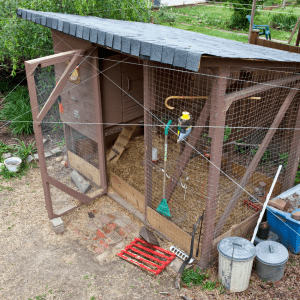
FAQ’s on a Clean Chicken Coop.
Q: Why is it important to keep a chicken coop clean?
A: Keeping a chicken coop clean is crucial for the health and well-being of your chickens. A clean coop helps prevent diseases, parasites, and odor, creating a safer and more comfortable environment for your flock.
Q: How often should I clean my chicken coop?
A: It is recommended to clean your chicken coop at least once a week. However, the frequency may vary depending on the size of your flock, coop size, and weather conditions. Regular maintenance is key to a clean and healthy coop.
Q: What are the benefits of using proper bedding in a chicken coop?
A: Proper bedding in a chicken coop helps absorb moisture, control odor, provide insulation, and offer a comfortable resting area for your chickens. Good bedding materials include straw, pine shavings, or shredded paper.
Q: How can I prevent pests in my chicken coop?
A: To prevent pests such as mites, lice, rodents, and wild birds in your chicken coop, keep the area clean and dry, use pest-resistant bedding, regularly inspect your flock for signs of infestation, and consider natural pest control methods.
Q: What are some tips for maintaining a clean chicken coop?
A: Some tips for maintaining a clean chicken coop include removing waste daily, replacing bedding regularly, providing proper ventilation, keeping food and water sources clean, and conducting deep cleanings periodically. Consistent care and attention to cleanliness will help ensure a healthy environment for your chickens.
Chicken Tractor for your Flock cuts down on a lot of work.
5 Herbs to Free Your Coop of Pests. Let Mother Nature work for you.
Protect your Coop From Raccoons. It all in the know how.
Adding dried herbs to your feed mix for good health.
Lavender Calms Laying Hens and repels pests.
4 Must Haves for Healthy Chickens









